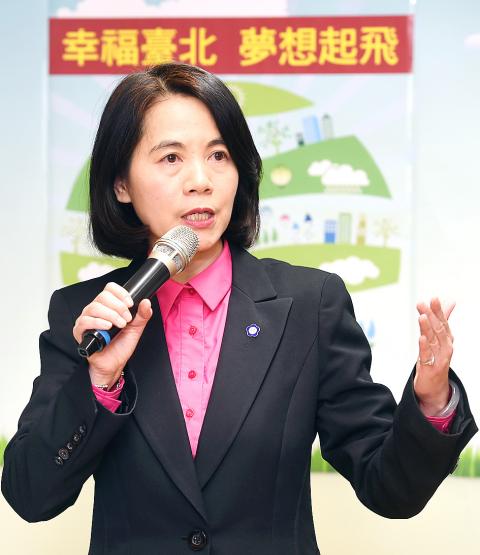National Chenchi University professor Chou Li-fang (周麗芳) yesterday was appointed Taipei’s third deputy mayor, following a two-month search.
Taipei Mayor Ko Wen-je (柯文哲) praised Chou’s academic and administrative experience, expressing his confidence in her ability to shoulder responsibility for departments including education, labor, sports and cultural affairs, as well as events such as the 2016 World Design Capital and 2017 Universiade.
In addition to her academic career, Chou has served as director of the university’s Office of Research and Development and deputy chief executive of the National Health Insurance Administration.

Photo: Liao Chen-huei, Taipei Times
While Ko’s first two deputy mayors were appointed in December last year, his search for a third has been held up for almost two months after he was unable to find a willing candidate with strong corporate executive experience, something he earlier attributed to the low pay offered by the municipal government.
“Teachers do not make very much in the first place,” he said yesterday in response to question on whether Chou’s salary had been a sticking point.
Taipei spokesman Sidney Lin (林鶴明) said that Chou was chosen from among 56 valid candidates who applied online in response to a Facebook post by Ko.
“I am someone who is willing to face challenges,” Chou said when asked why she accepted the position, adding that she was drawn to the position because of her desire to outline a cultural vision for the capital’s future.
On coordinating the 2017 Universiade, Chou said she would emphasize frugality and honing the event’s message.
“We hope to economize as much as possible, while still maximizing the benefits of the event,” she said.
“When the competitors come to Taiwan, aside from the competition itself, we hope they will serve as bees that carry back a rich pollen of memories to their home countries, aiding our diplomacy,” she said.
Chou is viewed as pan-blue due to her title of “special researcher” to the National Policy Foundation, a think tank associated with the Chinese Nationalist Party (KMT).

Alain Robert, known as the "French Spider-Man," praised Alex Honnold as exceptionally well-prepared after the US climber completed a free solo ascent of Taipei 101 yesterday. Robert said Honnold's ascent of the 508m-tall skyscraper in just more than one-and-a-half hours without using safety ropes or equipment was a remarkable achievement. "This is my life," he said in an interview conducted in French, adding that he liked the feeling of being "on the edge of danger." The 63-year-old Frenchman climbed Taipei 101 using ropes in December 2004, taking about four hours to reach the top. On a one-to-10 scale of difficulty, Robert said Taipei 101

Nipah virus infection is to be officially listed as a category 5 notifiable infectious disease in Taiwan in March, while clinical treatment guidelines are being formulated, the Centers for Disease Control (CDC) said yesterday. With Nipah infections being reported in other countries and considering its relatively high fatality rate, the centers on Jan. 16 announced that it would be listed as a notifiable infectious disease to bolster the nation’s systematic early warning system and increase public awareness, the CDC said. Bangladesh reported four fatal cases last year in separate districts, with three linked to raw date palm sap consumption, CDC Epidemic Intelligence

US climber Alex Honnold left Taiwan this morning a day after completing a free-solo ascent of Taipei 101, a feat that drew cheers from onlookers and gained widespread international attention. Honnold yesterday scaled the 101-story skyscraper without a rope or safety harness. The climb — the highest urban free-solo ascent ever attempted — took just more than 90 minutes and was streamed live on Netflix. It was covered by major international news outlets including CNN, the New York Times, the Guardian and the Wall Street Journal. As Honnold prepared to leave Taiwan today, he attracted a crowd when he and his wife, Sanni,

Taiwanese and US defense groups are collaborating to introduce deployable, semi-autonomous manufacturing systems for drones and components in a boost to the nation’s supply chain resilience. Taiwan’s G-Tech Optroelectronics Corp subsidiary GTOC and the US’ Aerkomm Inc on Friday announced an agreement with fellow US-based Firestorm Lab to adopt the latter’s xCell, a technology featuring 3D printers fitted in 6.1m container units. The systems enable aerial platforms and parts to be produced in high volumes from dispersed nodes capable of rapid redeployment, to minimize the risk of enemy strikes and to meet field requirements, they said. Firestorm chief technology officer Ian Muceus said